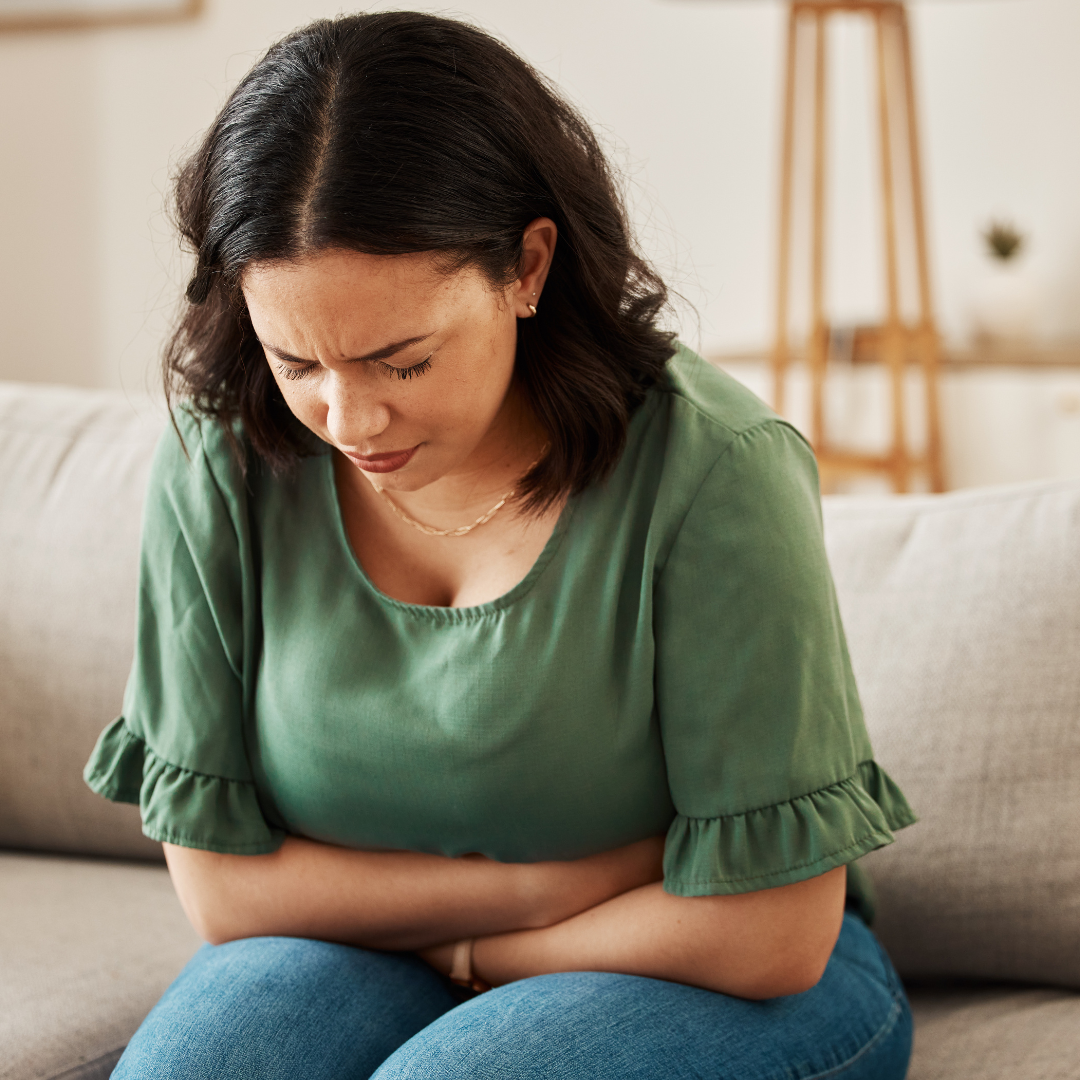
Menopause Tummy Ache – Causes and Solutions
Menopause tummy ache is a common side effect of menopause and perimenopause.
The sensation can range from discomfort to debilitating pains, and it’s often a symptom that many women don’t expect when they’re first entering perimenopause.
So, in this post, we’ll explore what menopause tummy ache is, reasons it could happen and natural at-home remedies to ease the pain. We’ll also take a look at when to see your GP.
With that in mind, here’s everything you need to know about menopause stomach ache.
Last Updated:
What is menopause tummy ache?
Abdominal pain is relatively common during perimenopause and menopause. Just like most menopause and perimenopause symptoms, this is often down to the falling oestrogen levels.
Menopause stomach ache is reported by so many women. The changes to your oestrogen and progesterone levels will impact your uterus and everything around it.
When this happens, you may feel period-like cramps, causing discomfort or full-on pain in your lower tummy.
Menopause tummy ache, just like menstrual cramps, feel like a dull ache or sharp cramps that spread over your abdomen. Or, at times, this pain can be isolated to a certain area.
What causes menopause tummy ache?
For the most part, menopause tummy ache is caused by the change to hormone levels. These drastic differences to your hormones along with other changes that happen during this time of life can lead to abdominal pain.
Your oestrogen levels in particular will impact your reproductive system as well as your urinary system, which can result in discomfort or pain.
It’s important to remember, though, that abdominal pain – even at this stage of life – could be a symptom of another condition. Endometriosis, for example, or fibroids could display themselves through tummy aches.
So, let’s take a look at other factors that could be causing your menopause tummy ache.

1. Constipation
Constipation can be extremely painful and can lead to stomach pain. During perimenopause and beyond, it’s easy to pin your tummy ache on age.
Constipation is more likely when you reach menopause because your digestion and metabolism starts to slow down. This is a leading factor in terms of weight gain, too.
If you have gastrointestinal disorders, such as irritable bowel syndrome, you’re more likely to suffer from constipation.
2. Gas (flatulence)
Trapped wind can cause real discomfort and even pain. When gas gathers in your intestines, your digestive system may not have broken down certain components of your food such as gluten or sugar.
Gas is a common symptom of perimenopause and menopause because when your oestrogen levels drop, the digestive process suffers and struggles to break down foods as effectively as before.
When this happens, you may feel a sharp pain in your tummy. This is “trapped wind.”
(Note: it’s not embarrassing! Everyone passes gas.)
3. Cramps
You’ll probably have experienced cramps throughout your life as many of us have had to deal with monthly cramps on our periods.
If you’re having tummy cramps, it often starts suddenly, seemingly out of nowhere, and ends just as quickly. The pain is usually quite intense and will come in waves.
Cramps can happen because of your menstrual cycle, constipation, menopause and perimenopause bloating, or indigestion.
They can also be a symptom of kidney gallstones, so it’s important to let your GP know if you’re struggling with abdominal cramps.
4. Indigestion
Indigestion happens – usually – after eating or drinking. It often causes tummy pain and is all down to your digestive system.
When your oestrogen levels drop in menopause, indigestion becomes more likely because your digestive system isn’t functioning as it should.
Indigestion can lead to heavy bloating, trapped gas, feeling a hot, burning sensation, nausea and – in extreme cases – sickness.
While indigestion is pretty common in menopause and perimenopause due to the hormonal changes, there are other causes. Irritable bowel syndrome, obesity and gastritis are all conditions that cause indigestion. That’s why you should also mention your symptoms to a GP.
5. Diarrhoea
If your stools are loose, liquid-y and frequent, you have diarrhoea. Unfortunately, diarrhoea isn’t uncommon in perimenopause and menopause.
Diarrhoea in menopause happens because the changes to your hormone levels will influence your intestinal flora.
The good news is, though, that this tends to only last a few days.
If you’ve had diarrhoea for more than a week, you should see a doctor. It could indicate another condition such as IBS that you can get treatment for.
6. Stress
Yes, stress can bring on menopause tummy ache. And stress levels can increase in perimenopause and menopause due to all of the symptoms and changes happening inside your body.
The stress hormone – cortisol – gets released from your adrenal glands. When cortisol levels fluctuate, your oestrogen levels do, as well. If your body produces too much cortisol, your digestive process can have a knock-on effect.
This can cause tummy ache and discomfort, and can develop into diarrhoea.
Home remedies for menopause tummy ache
We now know why menopause tummy ache happens. Thanks, oestrogen levels!
So, let’s take a look at some home remedies so that you can bid farewell to your menopause stomach ache.
1. Stay hydrated
Water is genuinely magical. Dehydration often leads to tummy pains, so it’s important to stay hydrated throughout the day.
You should avoid caffeine as it can dehydrate you. Not to mention, caffeine can trigger so many other menopause symptoms such as vaginal dryness, hot flashes, sleep disruption and night sweats.
Instead, opt for water and herbal teas.
If you want some flavour, add some sliced fruits into your water. Lemon, orange, cucumber and strawberries infused in H20 will guarantee to get you drinking more.
Make sure you’re eating foods with a higher water content, too. Take a look at my air fryer cauliflower recipes (which is also excellent for weight loss.)
2. Prioritise high quality sleep and relaxation
Perimenopause and menopause anxiety can start a vicious cycle.
When you’re anxious, the body produces too much cortisol. Not only can this lead to panic attacks but it can also trigger menopause tummy ache. This tummy ache can then feed your anxiety.
To break the cycle, it’s so crucial to find time to relax and get a good night’s sleep.
Breathing exercises and stress-relieving methods such as journaling, reading, and yoga will help keep you calm and reduce those cortisol levels.
3. Consume ginger
As a Menopause Nutritionist, I recommend ginger to so many of my clients as it helps with such a large range of symptoms, including menopause tummy ache.
Whether you choose to consume ginger in a supplement, as a raw vegetable or drink it in tea, it will help with your digestive process and reduce tummy cramps.
For most tummy problems, ginger is super helpful. It’s a gastrointestinal restorative and acts as a comfort blanket to your stomach, calming it down when it’s in distress.
It also contains anti-bacterial, anti-inflammatory and analgesic properties that will help get your stomach back on her feet and working at proper efficiency again.
4. Take a hot bath or use a hot water bottle
Just like you did during your menstrual cycle, heat will soothe menopause tummy ache.
When heat is applied to your lower abdomen, blood flow increases which contributes to reducing pain and muscle spasms.
Let’s not forget, too, that whether you’re soaking in a hot bath or pressing a hot water bottle against your tummy, it’s a relaxing sensation, working to reduce your cortisol levels.

5. Take pain relief if you need to
Before taking pain relief, seek the guidance of a healthcare professional.
If these natural methods don’t ease your tummy ache, you might want to consider using over-the-counter pain relief.
Again, make sure you speak with your doctor before taking medication, and it’s best to take them with food to avoid an upset stomach.
If these natural methods don’t work, though, it’s time to speak to a doctor to discover potential underlying reasons.
When to see a doctor
Menopause tummy ache is a complex symptom as it could be due to a number of causes.
That’s why you should see a doctor if you’ve experienced tummy aches for more than 3 days.
While tummy pains at this point of life is often down to falling levels of oestrogen, it could be a symptom of another disease, such as:
- Fibroids
- Endometriosis
- Gastrointestinal disorders
Menopause tummy ache – in a nutshell
Thanks to the lower levels of oestrogen, menopause tummy ache is a common complaint for so many women entering perimenopause and beyond.
Oestrogen directly impacts our digestive system, so it’s common to see disruption to the way we process and digest food as those hormone levels fluctuate.
However, whether you’re experiencing cramps, indigestion, diarrhoea or constipation, the good news is that there are many at-home remedies that’ll ease your tummy ache.
Make sure you stay hydrated and cut the caffeine, dedicate time to relax and get a good night’s sleep, consume ginger and take a hot bath or use a hot water bottle to ease the pain.
If the menopause tummy ache persists after these natural remedies, book an appointment to speak with your GP.
Leave a Reply
- free ebook alert -
WHAT TO EXPECT WHEN YOU’RE
going through the menopause
Demystify your understanding of what’s happening to you. Arm yourself with solid, game-changing information to support you through this challenging phase of your life.
grab your copy now →
WHAT TO EXPECT WHEN YOU’RE
going through the menopause